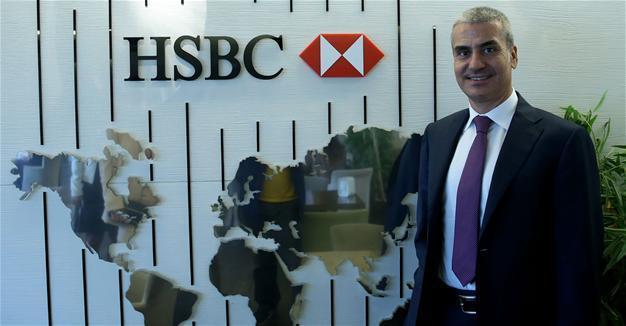HSBC rules out rumors about exiting the Turkish market
ANKARA - Anadolu Agency

AA Photo
HSBC is not planning to leave the Turkish market, the major international lender’s Turkey CEO has said.“HSBC has exited 17 to 18 countries and territories. In some countries, [HSBC] no longer provides private banking services. In Turkey, we have been through a restructuring process. We have absolutely no intention of selling the bank or moving out of the country,” Selim Kervancı told Anadolu Agency.
“We were one of the first foreign banks to enter the Turkish market. We decided to continue with a new strategy. This involves focusing on areas we are good at. And we are very good at wholesale banking. In retail banking, we will continue to focus on premium customers,” he said.
HSBC has the ability to enable Turkish corporations to access diversified financial instruments, he said.
“One of the most important problems [in Turkey] is the domestic savings gap. To reach a sustainable growth path, Turkey needs a major amount of foreign funding. We are the best bank to provide this,” he said. “There is a major foreign investment potential in Turkey. To turn this potential into investment, we have assigned ourselves a duty to be an ambassador to draw investment to Turkey. We are explaining the Turkish economy’s strength to everyone.”
He also said Turkey’s banking sector remained solid, especially with regards to its human capital, while also offering products, fundamentals and capital adequacy. But there are also challenges that put pressure on the profitability of the banks, he added. Kervancı appreciated the reactions of Turkey’s economic administration, especially the Central Bank, in the wake of the July 15 coup to introduce measures to enable markets to operate uninterruptedly.
“We should thank the Central Bank and the economy’s administrators. The measures taken [in the aftermath of the coup] established confidence in everyone. And this helped markets operate properly,” he said.
“Turkey has weathered really tough times recently, and during this period, the Turkish economy resumed from where it was. The wheels are turning,” he said, noting that all macro-economic figures in the Turkish economy continue to be solid despite the deterioration in the environment of confidence.
The CEO also noted the benefits of the recently formed sovereign wealth fund that will help fund Turkey’s mega projects given that the capacity of banks to fund such projects is nearing its limits.
“The establishment of the sovereign wealth fund is a very well-directed move,” he said.
Touching on the recent rate cut by Moody’s, Kervancı said the new rating had not created as much volatility in the Turkish markets as anticipated.
On Feb. 22, HSBC Chief Executive Officer Stuart Gulliver said the bank had decided to continue its Turkish operations after offers made to the bank were not deemed to be in the best interest of its shareholders.
“We were one of the first foreign banks to enter the Turkish market. We decided to continue with a new strategy. This involves focusing on areas we are good at. And we are very good at wholesale banking. In retail banking, we will continue to focus on premium customers,” he said.
HSBC has the ability to enable Turkish corporations to access diversified financial instruments, he said.
“One of the most important problems [in Turkey] is the domestic savings gap. To reach a sustainable growth path, Turkey needs a major amount of foreign funding. We are the best bank to provide this,” he said. “There is a major foreign investment potential in Turkey. To turn this potential into investment, we have assigned ourselves a duty to be an ambassador to draw investment to Turkey. We are explaining the Turkish economy’s strength to everyone.”
He also said Turkey’s banking sector remained solid, especially with regards to its human capital, while also offering products, fundamentals and capital adequacy. But there are also challenges that put pressure on the profitability of the banks, he added. Kervancı appreciated the reactions of Turkey’s economic administration, especially the Central Bank, in the wake of the July 15 coup to introduce measures to enable markets to operate uninterruptedly.
“We should thank the Central Bank and the economy’s administrators. The measures taken [in the aftermath of the coup] established confidence in everyone. And this helped markets operate properly,” he said.
“Turkey has weathered really tough times recently, and during this period, the Turkish economy resumed from where it was. The wheels are turning,” he said, noting that all macro-economic figures in the Turkish economy continue to be solid despite the deterioration in the environment of confidence.
The CEO also noted the benefits of the recently formed sovereign wealth fund that will help fund Turkey’s mega projects given that the capacity of banks to fund such projects is nearing its limits.
“The establishment of the sovereign wealth fund is a very well-directed move,” he said.
Touching on the recent rate cut by Moody’s, Kervancı said the new rating had not created as much volatility in the Turkish markets as anticipated.
On Feb. 22, HSBC Chief Executive Officer Stuart Gulliver said the bank had decided to continue its Turkish operations after offers made to the bank were not deemed to be in the best interest of its shareholders.
















